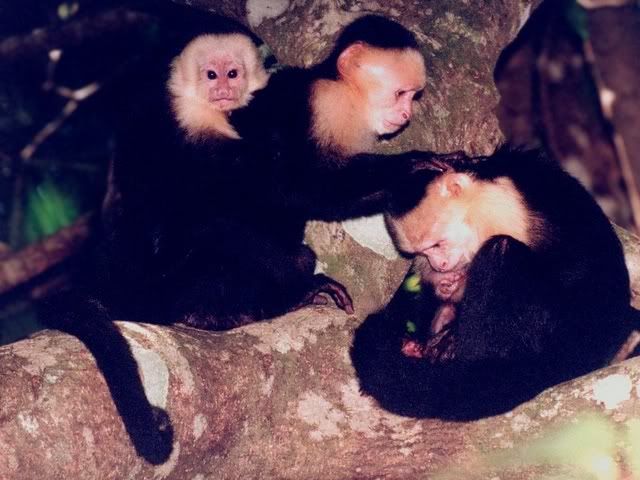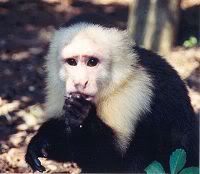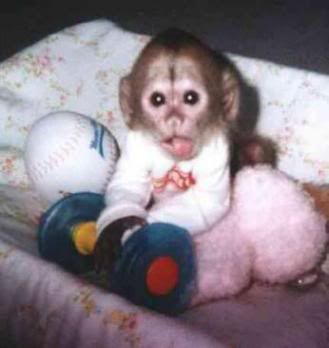Monkeys "Go on Strike" When They Sense Unfairness
National Geographic
In recent tests designed to assess monkeys' sense of fairness, a group of brown capuchin monkeys "went on strike" and refused to perform routine tasks when they saw others receiving greater rewards for the same tasks.
The more effort the primates used to earn a reward, the more upset they appeared to be at the inequity, according to scientists who conducted the research.

"In human terms it doesn't matter how hard you have to work for a million dollars," said lead researcher Sarah Brosnan of Georgia State University in Atlanta.
"But there's a pretty low cutoff point on what you'll do for five."
Building on previous research, Brosnan's team tested six pairs of monkeys on a simple task: handing a token to a human examiner in return for a food reward.
When monkeys noticed that their partners received better rewards for the same task-a cherished grape instead of a bit of cucumber-they became likely to refuse participation, the study showed.
The behavior, called inequity aversion, might have its roots in activities like food gathering, in which primates can suffer if they cooperate with others who do not do their share of work, Brosnan said.
Brosnan stressed that the primates' response wasnt one of simple greed or wanting a bigger payoff just because they knew one was available.
"What really mattered was if someone else got a better reward," she said, "not [just] that they wanted a better reward."
The team's findings appear in the new online version of the Proceedings of the National Academy of Sciences.
Grapes of Wrath?
Brosnan's team studied monkeys' sense of fairness in a similar test conducted in 2003.
In it, capuchins exchanged a piece of rock with their human handlers in return for a morsel of food. (See a photo of capuchin monkeys.)
Monkeys that witnessed their partners getting grapes often refused to conduct future exchanges, would not eat the cucumbers they received, and in some cases, threw their rewards at the researchers.
In the new study, the scientists tried to rule out alternate explanations for such behavior, including the possibility that the primates knew the grapes were available and were simply holding out for a better reward.
The monkeys were sometimes shown a grape before completing their task, but at other times they were unaware a grape was available. There was no discernible difference in the monkeys' responses, Brosnan said.
Researchers also distributed rewards evenly among the monkeys, so that no one animal was consistently rewarded or shortchanged.
The scientists found that the capuchins didn't become frustrated by expecting a grape simply because they had previously received one for doing the same task.
Laurie Santos, a Yale University psychologist, said, "The original study was met with much controversy in the field, including a number of now published claims that the original effect could not be replicated using slightly different tasks.
"Given this level of controversy, it's nice to see that their findings hold up when other alternative explanations are controlled," she added.
Evolution of Justice
Brosnan said her team's research scratches the surface of a philosophical quandary: Is the human sense of fairness instilled by social institutions like religion, or is it the product of a long genetic evolution?
Even if the primates are really displaying a sense of social justice in the experiment, it remains primitive in important ways, Brosnan said.
"We aren't seeing a whole lot of response [when the monkeys] are the better rewarded ones," Brosnan said.
"In humans we've expanded [our sense of justice] to [include] situations where another is treated badly."
Like humans, many monkeys live and interact in groups much larger than the study pairs. Exploring the complex dynamics of those social groups may be a next step for Brosnan and her colleagues.
"We'd like to study those relationships and how they affect their responses to inequity," she said.
















There's quite a few pictures out there of pet Capuchins in ridiculous-looking dresses, and that makes me sad for them.
Also, I added tags for people who post regularly/have posted numerous notable entries. If you're not on the list (under "poster:" ie. poster: tetrabinary) and you want to be, then just add yourself and go back and tag your entries. I just thought that there's some people in the community that make quite a few noteworthy entries, and have their own sense of style when it comes to posting here (meaning good information and interesting posts with lots of pictures and videos), so maybe other people would enjoy tracking some of those posters. Or maybe there was something you saw, but all you remember is the person who posted it. Or maybe you're one of the people tagged and would like to keep track of your stuff. Anyway, tag yourself if you think you deserve a spot on the tag list (because you've posted several good and interesting entries), or if I already added you but missed some of your posts. Tag list is here.
In recent tests designed to assess monkeys' sense of fairness, a group of brown capuchin monkeys "went on strike" and refused to perform routine tasks when they saw others receiving greater rewards for the same tasks.
The more effort the primates used to earn a reward, the more upset they appeared to be at the inequity, according to scientists who conducted the research.

"In human terms it doesn't matter how hard you have to work for a million dollars," said lead researcher Sarah Brosnan of Georgia State University in Atlanta.
"But there's a pretty low cutoff point on what you'll do for five."
Building on previous research, Brosnan's team tested six pairs of monkeys on a simple task: handing a token to a human examiner in return for a food reward.
When monkeys noticed that their partners received better rewards for the same task-a cherished grape instead of a bit of cucumber-they became likely to refuse participation, the study showed.
The behavior, called inequity aversion, might have its roots in activities like food gathering, in which primates can suffer if they cooperate with others who do not do their share of work, Brosnan said.
Brosnan stressed that the primates' response wasnt one of simple greed or wanting a bigger payoff just because they knew one was available.
"What really mattered was if someone else got a better reward," she said, "not [just] that they wanted a better reward."
The team's findings appear in the new online version of the Proceedings of the National Academy of Sciences.
Grapes of Wrath?
Brosnan's team studied monkeys' sense of fairness in a similar test conducted in 2003.
In it, capuchins exchanged a piece of rock with their human handlers in return for a morsel of food. (See a photo of capuchin monkeys.)
Monkeys that witnessed their partners getting grapes often refused to conduct future exchanges, would not eat the cucumbers they received, and in some cases, threw their rewards at the researchers.
In the new study, the scientists tried to rule out alternate explanations for such behavior, including the possibility that the primates knew the grapes were available and were simply holding out for a better reward.
The monkeys were sometimes shown a grape before completing their task, but at other times they were unaware a grape was available. There was no discernible difference in the monkeys' responses, Brosnan said.
Researchers also distributed rewards evenly among the monkeys, so that no one animal was consistently rewarded or shortchanged.
The scientists found that the capuchins didn't become frustrated by expecting a grape simply because they had previously received one for doing the same task.
Laurie Santos, a Yale University psychologist, said, "The original study was met with much controversy in the field, including a number of now published claims that the original effect could not be replicated using slightly different tasks.
"Given this level of controversy, it's nice to see that their findings hold up when other alternative explanations are controlled," she added.
Evolution of Justice
Brosnan said her team's research scratches the surface of a philosophical quandary: Is the human sense of fairness instilled by social institutions like religion, or is it the product of a long genetic evolution?
Even if the primates are really displaying a sense of social justice in the experiment, it remains primitive in important ways, Brosnan said.
"We aren't seeing a whole lot of response [when the monkeys] are the better rewarded ones," Brosnan said.
"In humans we've expanded [our sense of justice] to [include] situations where another is treated badly."
Like humans, many monkeys live and interact in groups much larger than the study pairs. Exploring the complex dynamics of those social groups may be a next step for Brosnan and her colleagues.
"We'd like to study those relationships and how they affect their responses to inequity," she said.
















There's quite a few pictures out there of pet Capuchins in ridiculous-looking dresses, and that makes me sad for them.
Also, I added tags for people who post regularly/have posted numerous notable entries. If you're not on the list (under "poster:" ie. poster: tetrabinary) and you want to be, then just add yourself and go back and tag your entries. I just thought that there's some people in the community that make quite a few noteworthy entries, and have their own sense of style when it comes to posting here (meaning good information and interesting posts with lots of pictures and videos), so maybe other people would enjoy tracking some of those posters. Or maybe there was something you saw, but all you remember is the person who posted it. Or maybe you're one of the people tagged and would like to keep track of your stuff. Anyway, tag yourself if you think you deserve a spot on the tag list (because you've posted several good and interesting entries), or if I already added you but missed some of your posts. Tag list is here.